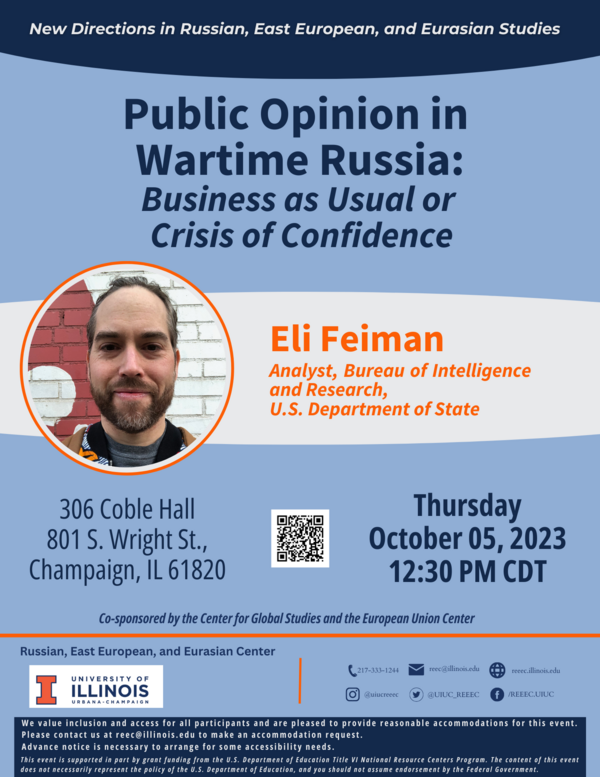REEEC New Directions Lecture: Eli Feiman, Public Opinion in Wartime Russia: Business as Usual or Crisis of Confidence
Oct 5, 2023 12:30 pm
306 Coble Hall (801 S. Wright St., Champaign, IL 61820)

- Sponsor
- REEEC
- Speaker
- Eli Feiman (U.S. Department of State)
- Cost
- Free and open to the public.
- Contact
- REEEC
- reec@illinois.edu
- Views
- 403
A light lunch will be provided with registration. For planning purposes, please let us know you are planning to attend this lecture by 12:00pm, Friday, September 29 using this link: https://forms.illinois.edu/sec/449600332.
You do not need to register to attend.A crackdown on protests and free speech in Russia since February 2022 have raised questions about the reliability of public opinion data about the Ukraine war and other key attitudes. According to skeptics, an intensified climate of fear is driving down response rates among critics of the war, who risk punishment for expressing negative opinions about events in Ukraine, which surveys can only refer to as a "special military operation," ultimately arguing that these factors bias survey data beyond all practical value. At the same time, public opinion research by domestic and international organizations continues apace, showing trends consistent across sources and resonant with changes following Russia's 2014 annexation of Crimea.In this talk, Feiman will address key challenges to collecting and understanding public opinion data from Russia. Additionally, he will outline the changes as well of continuities in the field of public opinion research in Russia before and after February 2022, assess Russian polling organizations’ current tests for reliability, and offer some new approaches for future consideration. Recognizing both the challenge of measuring attitudes in the current climate as well as its importance, Feiman will situate today’s Russia in broader literatures related to public opinion in authoritarian contexts and wartime. Leveraging multiple sources of data as well as practical and substantive expertise in survey research in Russia, he will propose a framework for researchers and policymakers for interpreting and where appropriate building trust in research on Russian public opinion.Eli Feiman is an analyst covering Russian and Central Asian public opinion for the Bureau of Intelligence and Research (INR) at the U.S. Department of State. He has worked for INR since January 2016. Before joining INR, he completed a doctorate in political science at the University of Michigan, in which he researched party creation by incumbent authoritarian rulers in the successor states of the Soviet Union.